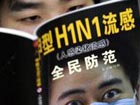| Videos | ? Latest |
|
? Feature | ? Sports | ? Your Videos |
A/H1N1 epidemic enter peak season
The mainland confirmed more than 48,000 cases of A/H1N1 influenza. Of those, 118 became critical cases, though most recovered, and 7 have died from the illness. Health authorities, warn the epidemic is now entering a peak period around the country.
The mainland has seen a surge in the number of new cases and group infections of the A/H1N1 flu since October.
During the last three weeks, health authorities have reported 16-thousand cases, accounting for one-third of the total.
At a working conference in Beijing on Monday, Health Minister Chen Zhu said the influenza was spreading from cities to rural areas, with most of the recent cases coming from schools.
Chinese Health Minister Chen Zhu said, "The epidemic of A/H1N1 flu in China has entered a period of high incidence earlier than we expected, and the number of cases is rapidly increasing. The epidemic could last until next March."
Chen also said that large-scale epidemics can be expected in some areas of the country, with peak periods occurring at different times in different areas.
The overall epidemic situation will remain at a high level for a long time, but is still controllable. Health authorities are urging that vaccinations against the flu be stepped up.
The Health Ministry also dismissed a rumor that A/H1N1 vaccinations of students before the National Day holiday led to recent outbreaks in Beijing. It said there were no massive inoculations in Beijing's elementary and middle schools before the holiday.
According to statistics by the Ministry, only two serious adverse reactions have been reported out of more than 3.8 million inoculations with the domestically produced A/H1N1 vaccine. Both were allergic reactions and received proper treatment. The safety and efficiency of the vaccine has been tested and proved.

 0
0 






